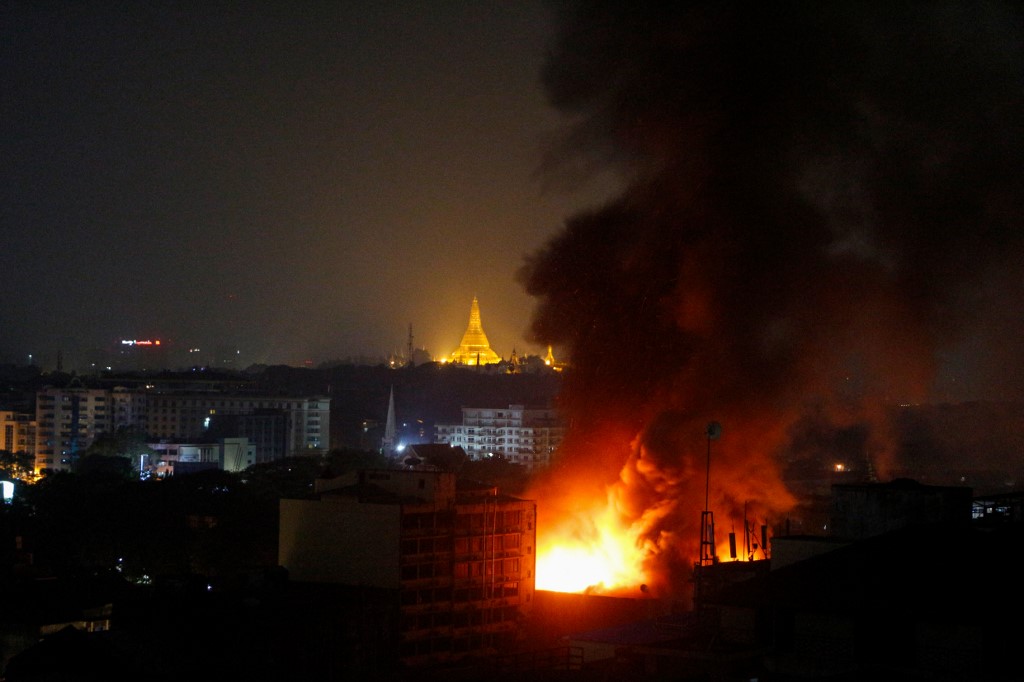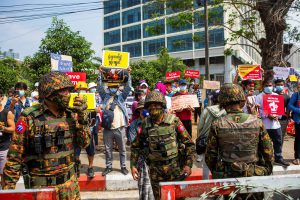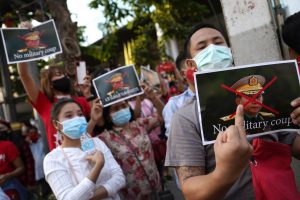(AF) Myanmar is on its knees. The military takeover on February 1 has triggered a mass uprising which has brought the economy to a standstill. But the slaying of well over 500 people and terrorizing of the civilian population has intensified public opposition – and led to fears that the country is on the brink of collapse.
A new report released on Thursday by the International Crisis Group has warned that the price of food is surging and the public health system is breaking down.
ICG said that a “deep economic crisis” with “rising poverty, a public health emergency and even hunger all now seem inevitable”, if the military does not change course.
It said the military had used reprehensible violence, but “this approach has hardened many people’s resolve to resist, including through strikes that paralyse governance and the economy, nudging Myanmar closer to state collapse”.
Anti-coup demonstrations have led to large numbers of battle-hardened troops being deployed into towns and cities, apparently because of concern about police joining the protest movement (as at least 800 have resigned including some senior officers).
Troops have set up bases in schools, universities and hospitals and are using harsh tactics – “shooting protesters, attacking compounds of striking public-sector workers and targeting the general population in cities like Yangon and Mandalay – unleashing night-time terror by beating, arresting and even murdering people apparently at random”.
ICG said the use of intimidation and violence had made things worse. “Efforts to force banks to reopen will fail when staff are terrified to leave home, and raids on branches that are open – to arrest unruly customers demanding their deposits – only spread panic. Threats to nationalise banks that do not comply will help precipitate the very outcome the regime wants to avoid – a run on the banks that are able to open.
“The generals seem unaware that they have destroyed the two most important economic commodities: trust and confidence.”
The banking crisis has shattered the economy.
“Many staff at state-owned and private banks, as well the Central Bank of Myanmar, have been on strike since shortly after the coup. Most bank branches remain shuttered and back-office functions – including payroll, interbank transfers and international payments – are barely operating. There is very little cash available through ATMs, and while mobile payment apps – widely adopted across the country in recent years – allow account-to-account transfers, in the current circumstances access to cash withdrawals via agents is severely limited.”
Strikes by other key workers, such as customs agents, dockworkers, truck drivers and rail workers, had made things worse.
“Major container shipping companies have also suspended services to the country because the ports are paralysed by the civil disobedience movement, disrupting both essential imports and exports.
Attempts to end strikes had backfired, as “much of the civil service still refusing to work for the regime”, it said.
One of the big concerns now is the increase in food insecurity, amid shortages of basic commodities and rising prices.
Citizens were aware of the likely economic and humanitarian consequences of their actions and many may have set up informal support mechanisms to help cushion the blow to workers and their families.
“By deliberately prompting an economic crisis with the intention of hurting the regime and its ability to govern effectively, people have accepted that their economic interests will also suffer.”
Poor and ill-paid workers from Yangon’s industrial zones were also among the most determined participants in the strikes and demonstrations, the report said, noting that “the economic damage has been such that many may no longer have jobs to return to.”
In the commercial capital Yangon, workers “are staying home as much out of fear as defiance… the violence and intimidation by soldiers and police has created a climate of such insecurity and fear that many people are unwilling to leave their homes, including to go to work.”
Threat of ‘Prolonged Socio-Economic Crisis’
“The situation looks set for a further downward spiral into a deep, prolonged financial and socio-economic crisis. That would do enormous damage to a national economy already reeling from the impact of Covid-19, but which had seen strong growth over the last decade of liberalisation, with the country’s poverty rate halved between 2005 and 2017.
“The result will likely be millions of people falling back into poverty.”
The ICG report said some ethnic armed groups could become entangled in the crisis, causing violence to spread into ethnic areas, or flaring in urban settings.
If conflict erupted on many different fronts it could send the country further into a downward spiral, it said, but noted that “there is no reason to believe the regime would feel it had to back down or that it was at risk of defeat. Such violence would undoubtedly stretch the Tatmadaw’s capacity, but its size and firepower are vastly superior to those of its potential opponents. Ethnic armed groups are well versed in guerrilla warfare and defending their upland areas, but most do not have the capability to conduct offensive operations in the lowlands.”
If regional and/or international powers are unable to convince the army to change course, ICG said the generals were “likely to fall back on what was the mainstay of the national economy during the last period of military rule: natural resources, including timber, natural gas, minerals, and jade and other gems. Given that the state owns most natural resources, these would offer the easiest and quickest source of revenue, as well as rent-seeking opportunities for military leaders.”
Illicit Economy Boom
Indeed, the coup could spur a boom in Myanmar’s illicit economy, which it said was estimated to be worth tens of billions of dollars a year.
“Apart from the illicit extraction and smuggling of jade, gems, precious metals, timber and minerals, it includes the production and trafficking of massive quantities of drugs (methamphetamine and heroin), unregulated casinos, money laundering, and human smuggling and trafficking, among other activities. These illegal activities have proven to be highly resilient in the face of previous economic shocks.”
ICG forecast grim repercussions if the military maintained its course – apparently designed to remove Aung San Suu Kyi and the NLD from political sphere in Myanmar – warning that “the country could become largely ungovernable.”
“A deep security, economic, humanitarian and health crisis would then be almost inevitable – the latter arising not only from a potential resurgence of Covid-19, but also from interrupted treatments for Myanmar’s large caseload of multi-drug-resistant tuberculosis and HIV patients and from stalled vaccination programs.
“Refugee flows to neighbouring countries have already started, with several thousand people fleeing to India and Thailand, numbers that could dramatically increase over the next months – a prospect for which Thailand has already started making preparations following regime airstrikes on KNU targets near its border since March 27,” it said.
- Jim Pollard
Note: This page was updated on July 21, 2022 to meet new style standards.
ALSO SEE:
Chinese Garment Factories Set Ablaze Amid Yangon Turmoil
Myanmar Coup: Did The Generals Fear Losing Their Billions?























